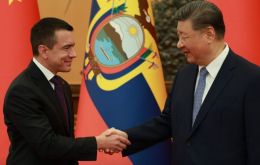MercoPress. South Atlantic News Agency
Economy
-
Thursday, July 3rd 2025 - 10:19 UTC
S&P doowngrades Bolivia's ratings

Standard & Poor's (S&P) downgraded Bolivia's long-term credit rating from 'CCC+' to 'CCC-' with a negative outlook. This decision was driven by increasing debt servicing costs and a deteriorating external financial profile, which could make it harder for the landlocked country to access financing and potentially hinder its ability to pay off debt in the coming months.
-
Wednesday, July 2nd 2025 - 23:34 UTC
Mercosur-EFTA FTA announced in Buenos Aires

The Southern Common Market's (Mercosur) Summit in Buenos Aires kicked off Wednesday with the announcement by Argentina, Brazil, Paraguay, and Uruguay of a Free Trade Agreement (FTA) finalized with the European Free Trade Association (EFTA - Iceland, Liechtenstein, Norway, and Switzerland). The documents are to be signed in the coming months.
-
Wednesday, July 2nd 2025 - 15:07 UTC
Mercosur widens list of external tariff-free goods

The Southern Common Market (Mercosur) countries will be allowed to add 50 product types to the bloc's common external tariff-free items, per an agreement signed in Montevideo.
-
Wednesday, July 2nd 2025 - 10:55 UTC
Bi-oceanic corridor feared to hamper Montevideo Port's future

Uruguayan National Port Administration's (ANP) representative at the River Plate Basin Terminal (TCP), Jorge Pozzi, raised concerns Tuesday during a radio interview about the future of Montevideo's port. In his view, the proposed Pacific-Atlantic bioceanic corridor, connecting Brazil with Chile or Peru, could bypass Uruguay entirely, significantly impacting its system, economy, and thousands of workers.
-
Tuesday, July 1st 2025 - 10:55 UTC
US judge rules against Argentina in YPF restatization case

Judge Loretta Preska of the Southern District Court of New York ordered Argentina to transfer 51% of YPF shares to an escrow account to settle a US$16.1 billion judgment in favor of Burford Capital and Eton Capital, stemming from the 2012 expropriation of the oil company. The ruling, which Argentina may appeal, surprised the government, as even the US Department of Justice opposed it. The decision led to a sharp decline in YPF shares (1.4% on Wall Street, 3% locally) and a 2% drop in the Merval index.
-
Monday, June 30th 2025 - 18:27 UTC
Orsi speaks wonders of 2030 Agenda in Seville

Speaking at the 4th International Conference on Financing for Development Monday in Seville, Spain, Uruguayan President Yamadú Orsi defended multilateralism and the 2030 Agenda as key to addressing global issues like poverty, hunger, and pollution.
-
Saturday, June 28th 2025 - 10:39 UTC
IMF team rounds up mission to Argentina

The International Monetary Fund (IMF) concluded a four-day technical mission in Buenos Aires to review Argentina’s compliance with a new US$20 billion agreement signed in mid-April 2025, it was announced Friday in Buenos Aires.
-
Friday, June 27th 2025 - 18:54 UTC
China and Ecuador deepen bilateral ties

Chinese President Xi Jinping welcomed his Ecuadorean colleague Daniel Noboa in Beijing Friday to strengthen bilateral ties, marking the 45th anniversary of diplomatic relations. The leaders signed a cooperation plan to advance the Belt and Road Initiative (BRI), which the South American country joined in 2018, to boost infrastructure, trade, and investment.
-
Tuesday, June 24th 2025 - 10:25 UTC
Argentina's GDP grows 5.8%, Indec reports

Argentina's Gross Domestic Product (GDP) grew by 5.8% year-over-year and 0.8% compared to the last quarter of 2024 in the first quarter of 2025, the National Institute of Statistics and Census (Indec) reported Monday in Buenos Aires.
-
Tuesday, June 24th 2025 - 10:12 UTC
IMF mission arriving in Buenos Aires to monitor progress

A technical mission from the International Monetary Fund (IMF), led by Bikas Joshi, is due in Buenos Aires on Tuesday to conduct the first review of Argentina's new economic program. The proceedings were initially set for June 15 but postponed to allow more time for the Libertarian Government of President Javier Milei to meet reserve targets.
